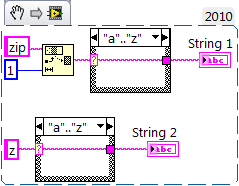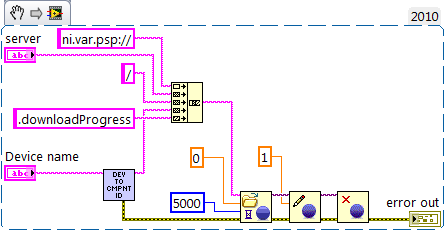-
Posts
160 -
Joined
-
Last visited
-
Days Won
3
Content Type
Profiles
Forums
Downloads
Gallery
Everything posted by mike5
-

closed review Suggestions for OpenG LVOOP Data Tools
mike5 replied to drjdpowell's topic in OpenG Developers
How does "Get class name" work through inheritance? Does it return the correct class name at each level? Even whan called from dynakic dispatch method? (I don't have the time to test it right now...) Br, Mike -

I am switching to a new job (though still with NI)
mike5 replied to Aristos Queue's topic in LAVA Lounge
So, I guess the question is "Have you trained a successor for your current role, and when do we get to meet him?" But seriously, thank you for your help and involment with user community. I didn't deal with you directly much, but whenever I saw your post I thought "now we'll get some real answers". To have someone like that from NI is great for us developers and users. That is also the reason for my openig joke. We came to rely on you for the really difficult stuff so much, that hearing you saying "I won't be able to help you to the extent that I used to" makes me nervous. I just hope your superiors are aware of this, and have someone ready to step in your current shoes. Good luck with your next assignment. I'm sure you'll be excellent at it, as you are now. Br, Mike -
Hi all. UDP is a connectionless protocol, but still the stack receives an ICMP error message if sending to a non-bound port. In short, is there a way to get some sort of error if sending UDP datagram to the server that is just not there? Thanks in advance and best regards, Mike
-
Any idea when the bug fixes will be coming into a new release? Thanks and best regards, Miha
-
Thanks for looking into this, and glad I helped to move things along. I'll rather keep my own function until a new OpenG release, since consumers of my project need to be able to get zlib independently. Br, Mike
-
Thanks TheJ, and AQ. I'll take a look at this. Actually, it didn't help. The function knows how to look at inside the F1 type to determine that it contains a cluster. We have in the mean-time deduced that F1 stands for "type definition" or something similar. So, if our cluster is in the type-def control, then it has F1, if we just copy it out and onto the block diagram as a constant, the F1 goes away, leaving only the cluster. There are still a few unknowns, but we'll hopefully figure them out sooner or later. Br, Mike
-
He didn't need to change thing. Windows 7 has this "Font size" setting, and for small screens (like laptops) it automatically sets it to 125%. For most NI software it is possible to create the ini file that is named the same as the exe, and adjust the font size in there. You create a section that ha the name of the application and adjust font sizes. This is from my "Example Finder" ini file: [NIExampleFinder] appFont="0" 18 dialogFont="2" 18 systemFont="1" 18[/CODE] Maybe the same will work for the setup file. Cheers, Mike
-
My hand-coded function works as it should. Here is the snippet if anyone is interested: This is the case for Folder (16): Br, Mike
-
Thanks for the pointer to the special procedures. I'll check it out. Regarding the ZLIB - I just built the project and assumed everything is alright But in the mean time I also tried creating and explicit function which iterates through the ZIP file, creates folders as it goes and generally takes care of "/" -> "\" conversion. I got a method that was running on RT without any errors (simply run a VI on the RT target). So now I'm trying the project again. Will let you know of the results. And the OS is ETS Phar Lap. Thanks, Mike
-
Another question - if I fix this, what is the procedure for getting it included the next version? Also, who to discuss the fixes with? I guess the code has to conform to some standards. Br, Miha
-
Yes, I know and I did. I found out that all OpenG type descriptor functions are centered around "Variant to flattened string" function. I just wanted to point out that it seems like "Variant to flattened string" and "Flatten to string" are producing a little bit different header representation. Br, Mike
-
Unfortunately not, because OpenG uses "Variant to flattened string" and I am using "Flatten to string". I need the latter for its "define endianness" capability. And I think "Flatten to string" works a bit differently. Br, Mike
-
Sorry if I'm venting here, but this library has tons of problems with folder '/' separator and I cannot believe that I have the only ZIP archiver that uses this. Didn't anyone test this? Am I missing something simple here, or what? Mike
-
Hi all OpenG fans! I have a ZIP file with some folders and files inside. I want to extract entire archive exactly as it is with ZLIB Extract All Files To Dir__ogtk.vi. The thing works on Windows, but on PXI RT it throws the following error. Create Folder in Create Dir if Non-Existant__ogtk.vi->ZLIB Get File__ogtk.vi->ZLIB Extract All Files To Dir__ogtk.vi->Download Data Bundles.vi:1->Prepare device.vi<APPEND> c:\dev\software\BD-Controller/ The library is 4.0.0-2. Can someone help me work out a fix for this? Thanks in advance, Mike
-
Digging a bit further, the real problem for me comes later on: So, the last type descriptor is as follows: two strings identifying the library that owns the type def (alright, I guess); the standard part of the type descriptor, listing the types of all the elements of the cluster; the name of the actual control/constant (comes from label). is there a way to anonymize this type descriptor? Because now people (and that includes me), drag the type def onto the front panel and give it a name, since it's a parameter. But this means that the serializations differ because of the different parameter name - the third bullet point up there. And since I don't know the full meaning of the data serialization (F1 up there), I don't analyze the serialization deeply enough and they look to be of different type, and some stuff fails because of it. Or, can I at least get a nice description of how F1 type descriptor is composed so that I parse it properly, ignoring the stuff that is not important. Also, can I get a list of all the hidden Type descriptors like F1. I only know of the ones listed in http://zone.ni.com/reference/en-XX/help/371361G-01/lvconcepts/type_descriptors/ Thanks again, Mike
-
We're working on some data serialization, and as a result I need to be able to parse the type definition data. I have most of it figured out, but I'm getting a strange type after composing a very large cluster = 15 elements: Namely - the type descriptor starts with: 00 67 00 F1 What the hell is type descriptor F1 ???? I can't find it anywhere 00 00 00 00 00 00 00 02 Next follow the name of the parent library and the name of the type def being serialized. 2 elements, I know. But I'd still like to know what "00 F1" stand for. Maybe someone with the ability to look at source (cough, cough) Thanks in advance, Mike
-
Thanks!
-
Hi all, I have a question regarding the use of the variant as hash: suppose you have the variant in an object, and you store some values into it. What happens when the object gets out of scope and is garbage collected? Is the variant hash cleared as well? Or does the "Delete Variant Attribute" need to be called to prevent memory leak? Thanks in advance, Mike
-
Small terminals!!! And while we're on the subject, can you maybe change the LV behavior to automagically convert the terminals to the user-preferred type. BecauseI really don't like it when I open a VI on a project someone else created and see the icons instead of small terminals. Not to mention block diagrams that have both mixed But I actually do like icons in one case: cluster constants Mike
- 74 replies
-
Thanks. I guess it's just one of those things where you never actually read the docs, because you use the thing every day. Br, Mike
-
It is a bug, since either it is or it isn't. But this one isn't just in the first case. In case of a constant it is. Br, Mike Also, it also works for any string beginning with "a", so my guess is still it's a bug. Br, Miha
-
Here is a little something I found today: and the VI that demonstrates it. Run this, and String 1="bug" String 2="z" Change zip->yip and String 1 becomes "y". Nice, ha? Br, Miha The workaround is "a".."z", "z" Br, Miha bug.vi
-
Nothing to see here, it was just put-my-disk-drive-in-another-laptop weirdness.
-
This code is copy&paste from a larger VI. The only problem is, that in the larger VI it gets an error -1967362038 in the "Open and Verify", and in the smaller one it doesn't. The "server" and "Device name" values were also copied form the larger one. Any ideas would be greatly appreciated. Mike Correctio. If the VI is in a NEW project, it works. Otherwise it doesn't.





